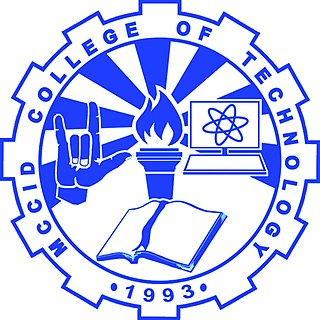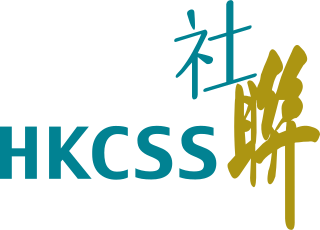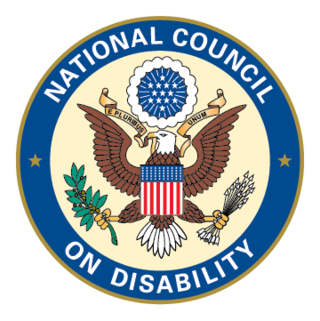
The Rehabilitation Act of 1973 is a United States federal law, codified at 29 U.S.C. § 701 et seq. The principal sponsor of the bill was Rep. John Brademas (D-IN-3). The Rehabilitation Act of 1973 replaces preexisting laws to extend and revise the authorization of grants to States for vocational rehabilitation services, with special emphasis on services to those with the most severe disabilities, to expand special Federal responsibilities and research and training programs with respect to individuals with disabilities, to establish special responsibilities in the Secretary of Health, Education, and Welfare for coordination of all programs with respect to individuals with disabilities within the Department of Health, Education, and Welfare, and for other purposes. It created the Rehabilitation Services Administration.

Manila Christian Computer Institute for the Deaf (MCCID) is a non-sectarian, post-secondary, Christian foundation school for the deaf in the Philippines authorized by the Technical Education and Skills Development Authority (TESDA) to offer non-degree computer and other technical training programs.

The National Police Commission is an agency attached to the Department of the Interior and Local Government (DILG) responsible for the administration and control of the Philippine National Police (PNP). It has the authority to administer police entrance examination, to investigate police anomalies and irregularities, and to summarily dismiss erring police officers.

The Department of Budget and Management is an executive body under the Office of the President of the Philippines. It is responsible for the sound and efficient use of government resources for national development and also as an instrument for the meeting of national socio-economic and political development goals.

The Philippines' Department of Social Welfare and Development is the executive department of the Philippine Government responsible for the protection of the social welfare of rights of Filipinos and to promote the social development.

International Day of Persons with Disabilities is an international observance promoted by the United Nations since 1992. It has been observed with varying degrees of success around the planet. The observance of the Day aims to promote an understanding of disability issues and mobilize support for the dignity, rights and well-being of persons with disabilities. It also seeks to increase awareness of gains to be derived from the integration of persons with disabilities in every aspect of political, social, economic and cultural life. It was originally called "International Day of Disabled Persons" until 2007. Each year the day focuses on a different issue.
In 2003 and following years, initiatives were instituted to improve internet access for people with disabilities in the Philippines. These measures were inspired by the UNESCAP "Asia-Pacific Decade for Disabled Persons" (1993–2002). Key organizations included the government body National Council for the Welfare of Disabled Persons (Philippines) and the private sector body Philippine Web Accessibility Group (PWAG). The "Disabled Friendly Website Awards" were launched to encourage web designers to incorporate universal access. Since 2009 unhampered access to Information and Communications Technology (ICT) has been in the second National Human Rights Action Plan of the Philippine government.

The Hong Kong Council of Social Service is a council coordinating NGOs in the social service field in Hong Kong, established in 1947. The Hong Kong Council of Social Service represent more than 480 Agency Members that provide social services through their 3,000 operating units in Hong Kong.

The National Council on Disability (NCD) is an advisory agency on disability policy in the United States for all levels of government and for private sector entities

Christian Blind Mission (CBM) is an international Christian development organization, committed to improving the quality of life of persons with disabilities in the poorest communities of the world. It is considered one of the world's oldest and largest organizations working in this field.

Inclusion, in relation to persons with disabilities, is defined as including individuals with disabilities in everyday activities and ensuring they have access to resources and opportunities in ways that are similar to their non-disabled peers. Disability rights advocates define true inclusion as results-oriented, rather than focused merely on encouragement. To this end, communities, businesses, and other groups and organizations are considered inclusive if people with disabilities do not face barriers to participation and have equal access to opportunities and resources.
The Rehabilitation Services Administration (RSA) is a federal agency under the United States Department of Education, Office of Special Education and Rehabilitative Services, and is headquartered within the Department of Education in Washington, D.C. It was established to administer portions of the Rehabilitation Act of 1973. Its mission is to provide leadership and resources to assist state and other agencies in providing vocational rehabilitation (VR) and other services to individuals with disabilities to maximize their employment, independence and integration into the community and the competitive labor market.
The Ministry of Social Justice and Empowerment is a Government of India ministry. It is responsible for welfare, social justice and empowerment of disadvantaged and marginalised sections of society, including scheduled castes (SC), Other Backward Classes (OBC), LGBT people, the disabled, the elderly, and the victims of drug abuse. It also helps in the enforcement of legislation with regards to these marginalized groups to better enforce anti-discrimination policies.

The China Disabled Persons' Federation (CDPF) is a people's organization for individuals with disabilities in China established in Beijing, China in March 1988. The predecessors of the CDPF are the China Association for the Blind and Deaf, established in 1960 and the China Welfare Fund for the Handicapped established in 1984. The three basic functions of the CDPF are to represent the interests of people with disabilities in China and help protect their legitimate rights, to provide them with comprehensive and effective services and to supervise affairs relating to people with disabilities commissioned by the Chinese government. The emblem of the CDPF looks like a plum flower which features prominently in Chinese art and culture. With its motto "humanity, probity, service and contribution" the CDPF has helped many disabled persons.
Mental health in the Philippines is a survey of the status of psychological, psychiatric, and emotional health care in the Philippines from both past and present programs.

People with disabilities in Pakistan are seen differently than in most Western countries due to cultural and religious beliefs. The lack of accurate epidemiological evidence on disabilities, insufficient resources, weak health care facilities and worker shortages are major obstacles to meeting the needs of disabled Pakistanis.
Bengt Olof Lennart Lindqvist was a Swedish politician and advocate of persons with disabilities.

Singapore does not have a formal definition of disability. Singapore signed on to the Convention on the Rights of Persons with Disabilities in 2013 and coordinates the Enabling Masterplan with both government and non governmental organisations.

In the Philippines, disability is one of the social issues affecting a portion of the Philippines' population. To ensure the equality and rights of disabled persons, there are Philippine laws and policies that were passed regarding persons with disabilities (PWDs). There are also numerous non-government associations that seeks to encourage and help improve the wellbeing of people with disabilities.
The National Commission for Persons with Disabilities (NCWD) is an agency in Nigeria. The agency was established in 2020.














